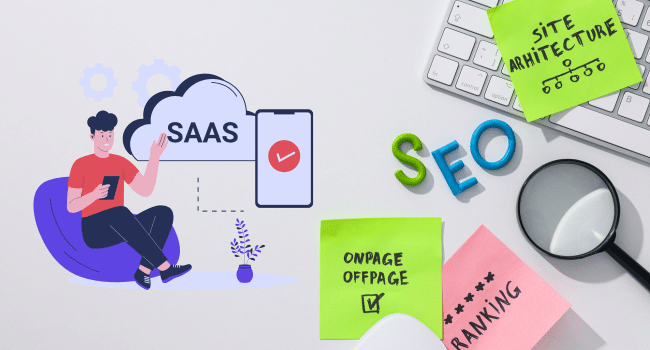Table of Contents
In the fast-paced world of software-as-a-service (SaaS), growth often hinges on visibility. While paid ads offer quick wins, they’re rarely sustainable long-term. That’s where SaaS SEO steps in offering a high-ROI, compounding growth strategy that builds trust, drives inbound leads, and lowers customer acquisition costs. In this article, we’ll explore the ultimate SaaS SEO strategy and how partnering with a SaaS SEO agency can help you scale organically without relying on paid media.
Why SaaS SEO is a Game-Changer
For SaaS companies, SEO isn’t just about ranking for keywords, it’s about aligning your content and technical infrastructure with user intent across the customer journey. From TOFU (top of funnel) blogs to BOFU (bottom of funnel) product pages, a strategic SaaS SEO approach ensures you’re discoverable at every stage.
Unlike ads that stop delivering once the budget dries up, SEO efforts compound. The blog post you write today could drive traffic for years. The FAQ schema you implement can boost CTR instantly. SEO is the foundation for sustainable, long-term growth.
Key Elements of a Winning SaaS SEO Strategy
1. In-Depth Keyword Research Based on User Intent
Start by identifying keywords based on buyer personas. Consider:
- Pain points your product solves
- Questions users ask before converting
- Competitor gaps in content
Tools like Ahrefs, Semrush, or Google Search Console can help pinpoint keywords, but the key is aligning them with SaaS-specific intent such as best CRM for startups” or “email automation tools for ecommerce.
2. Create Bottom-of-Funnel (BOFU) Content First
While TOFU blog content builds awareness, BOFU content converts. Focus initially on:
- Product comparisons
- Use case pages
- Customer testimonials
- Feature-specific landing pages
These pages should be optimized for high-intent queries and clearly highlight your product’s value proposition.
3. Implement Scalable Topic Clusters
A structured content strategy is critical. Using topic clusters, you can organize your content around key themes:
- One pillar page (e.g., “SaaS Marketing Automation”)
- Multiple supporting articles (e.g., “Best Email Workflows for SaaS,” “How to Nurture SaaS Leads”)
Link them together internally to boost authority and crawlability.
4. Optimize for Technical SEO
Fast, secure, and mobile-friendly websites win in the SaaS space. Ensure:
- Fast load times (under 2 seconds)
- HTTPS security
- Mobile responsiveness
- Clean URL structures
- XML sitemaps and structured data (e.g., product, FAQ, review schema)
Partnering with a SaaS SEO agency can help audit and optimize these elements consistently.
5. Build Authoritative Backlinks
Link building remains a core part of SEO. Focus on:
- Guest posting on niche blogs
- Securing SaaS product listings
- Earning links through high-quality research, stats, or free tools
- Digital PR campaigns and founder interviews
Pay attention to link velocity, the rate at which you build backlinks. A steady, natural growth rate is favored by search engines and avoids penalties.
Why Work with a SaaS SEO Agency?
A specialized SaaS SEO agency brings deep industry knowledge, advanced tools, and proven strategies to the table. They understand the nuances of the SaaS customer journey and how to tailor content and technical improvements to match.
Benefits of working with a SaaS SEO agency include:
- Faster implementation and testing cycles
- Access to SEO specialists, writers, and developers
- Data-driven performance tracking
- Scalable, ROI-focused growth strategies
Instead of managing SEO in-house which can drain time and resources—partnering with experts allows SaaS founders and marketers to focus on product and customer success.
Measuring Success in SaaS SEO
To know if your SaaS SEO strategy is working, monitor these KPIs:
- Organic traffic to BOFU pages
- Click-through rate (CTR) on search results
- Keyword rankings for high-intent terms
- Inbound demo or trial signups from organic
- Link velocity and referring domains
- Customer acquisition cost (CAC) from SEO
Using platforms like Google Analytics, Search Console, and Ahrefs will help you gauge impact and optimize efforts over time.
Final Thoughts
Scaling your SaaS product through SEO takes time, strategy, and consistent execution but the payoff is worth it. Instead of chasing short-term wins with expensive ads, build a long-term growth engine through content, links, and technical excellence. By partnering with a SaaS SEO agency and applying a well-rounded SaaS SEO strategy, your brand can achieve scalable, sustainable growth without being at the mercy of rising ad costs.
